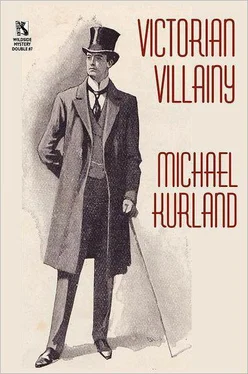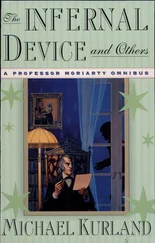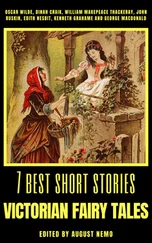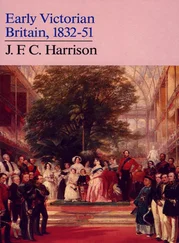Michael Kurland - Victorian Villainy
Здесь есть возможность читать онлайн «Michael Kurland - Victorian Villainy» весь текст электронной книги совершенно бесплатно (целиком полную версию без сокращений). В некоторых случаях можно слушать аудио, скачать через торрент в формате fb2 и присутствует краткое содержание. Жанр: Классический детектив, на английском языке. Описание произведения, (предисловие) а так же отзывы посетителей доступны на портале библиотеки ЛибКат.
- Название:Victorian Villainy
- Автор:
- Жанр:
- Год:неизвестен
- ISBN:нет данных
- Рейтинг книги:5 / 5. Голосов: 1
-
Избранное:Добавить в избранное
- Отзывы:
-
Ваша оценка:
- 100
- 1
- 2
- 3
- 4
- 5
Victorian Villainy: краткое содержание, описание и аннотация
Предлагаем к чтению аннотацию, описание, краткое содержание или предисловие (зависит от того, что написал сам автор книги «Victorian Villainy»). Если вы не нашли необходимую информацию о книге — напишите в комментариях, мы постараемся отыскать её.
Victorian Villainy — читать онлайн бесплатно полную книгу (весь текст) целиком
Ниже представлен текст книги, разбитый по страницам. Система сохранения места последней прочитанной страницы, позволяет с удобством читать онлайн бесплатно книгу «Victorian Villainy», без необходимости каждый раз заново искать на чём Вы остановились. Поставьте закладку, и сможете в любой момент перейти на страницу, на которой закончили чтение.
Интервал:
Закладка:
“He was a regular visitor to the demi-monde?”
“Say rather he dwelled in its precincts,” Mrs. Atterleigh said.
Moriarty turned to me. “Mrs. Atterleigh is my gazette to the fils du joi — the harlots, strumpets and courtesans of London,” he said. “They all trust her, and bring her their problems. And on occasion, when it violates no confidences, she passes on information to me.”
I remained silent and sipped my port.
“Was his lordship keeping a mistress?” Moriarty asked.
“Always,” Mrs. Atterleigh replied. He changed them every three or four months, but he was seldom without.”
“Do you know who was the current inamorata at the time of his death?”
“Lenore,” she said. “Dark haired, slender, exotic looking, artistic; she is, I believe, from Bath.”
“Will she speak with me?” Moriarty asked.
“I’ll give you a note,” Mrs. Atterleigh said. “I would come with you, but I’m expecting company momentarily.”
Moriarty rose to his feet. “Then we will not keep you. If you would be so kind-“
Mrs. Atterleigh went to her writing-desk and composed a brief note, which she handed to Moriarty. “I have written the address on the outside,” she said. “Please come back to see me soon, when you don’t have to run off.”
“I shall,” Moriarty said.
She turned to me and stretched out a hand. “Mr. Barnett,” she said. “You are welcome here, too. Any time. Please visit.”
“I would be honored,” I said.
We left the house and walked down the street to hail a cab. As the vehicle took us back up the street again, I saw a black covered carriage stop in front of the house we had just left. A man in formal attire got out and went up the steps. Just as we passed he turned around to say something to his driver and I got a good look at his face. “Moriarty!” I said. “That was the prime minister!”
“Ah, well,” Moriarty said. “He is reputed to have an excellent wine cellar.”
The address we went to was in a mews off St. Humbert’s Square. A small woman with raven-black hair, bright dark eyes, and a cheerful expression threw the door opened at our ring. She was wearing a painter’s smock, and by the daubs of color on it I judged that the garment had seen its intended use. “Well?” she demanded.
“Miss Lenore Lestrelle?” Moriarty asked.
She looked us up and down, and didn’t seem impressed by what she saw. “I have enough insurance,” she said, “I don’t read books, and if a distant relative died and left me a vast fortune which you will procure for me for only a few pounds for your out-of-pocket expenses, I’m not interested, thank you very much. Does that cover it?”
Moriarty handed her the note and she read it thoughtfully and then stepped aside. “Come in then.”
She led us down a hallway to a long room at the rear which had been fixed up as an artist’s studio. A easel holding a large canvas on which paint had begun to be blocked in faced us as we entered the room. On a platform under the skylight a thin red-headed woman, draped in artfully arranged bits of gauze, stood with a Greek urn balanced on her shoulder.
“Take a break, Mollie,” Miss Lestrelle said. “These gentleman want to talk to me.”
Mollie jumped off the platform and pulled a housecoat around her shoulders. “I’ll be in the kitchen then, getting sommat to eat,” she said. “Call me when you need me.”
A large wooden table piled high with stacks of books and clothing and assorted household goods stood against one wall, surrounded by similarly burdened straight back chairs. Miss Lestrelle waved in their general direction. “Take your coats off. Sit if you like,” she said. “Just pile the stuff on the floor.”
“That’s all right, Miss Lestrelle,” Moriarty said.
“Suit yourself,” she said. “Don’t bother with the ‘Miss Lestrelle.’ Lenore is good enough.”
“My name is Professor Moriarty, and this is Mr. Barnett,” Moriarty told her.
“So the letter said. And you want to know about Vincent. Why?”
“We are enquiring into his death.”
“I can’t be much help to you there. I didn’t see him for several days before he died.”
“I thought he was-ah-“
”Keeping me? That he was. In a nice flat in as fashionable a section of town as is reasonable in the circumstances.” She waved a hand at the goods piled up on the table. “Those are my things from there. I’ve just finished moving out.”
“Ah!” Moriarty said. “The brother evicted you?”
“I’ve not seen the brother. This is where I do my work, and this is where I choose to be. I am an artist by choice and a harlot only by necessity. As there was no longer any reason to remain in that flat, I left.”
A fair number of canvases were leaning stacked against the near wall, and Moriarty started flipping them forward and examining them one at a time. “You don’t seem overly broken up at his lordship’s death,” he commented.
Lenore turned, her hands on her hips, and glared at Moriarty. After a moment she shrugged and sat on a high wooden stool by her easel. “It was not a love match,” she said. “Most men want their mistresses to provide love and affection, but Vincent wanted only one thing of his women: to be there when he called. He was not particularly faithful to the girl he was keeping at the moment, and he tired of her after a few months. As I’d been with Vincent for over three months, I expected to be replaced within the fortnight. The flat he kept, the girls were transitory.”
“You had to be at the flat all day waiting for him?”
“After ten at night,” she said. “If he hadn’t found another interest by ten or eleven, he wanted to have some one to come home to.”
“Did he ever discuss his business affairs with you?”
“Never.”
“Ever have any visitors?”
“Once we had another girl in for the evening, but aside from that none.”
“How did you feel about that?”
Lenore shrugged. “He was paying the bills,” she said.
Moriarty looked up from his study of the paintings. “How would you describe his sexual tastes? You can speak freely. Mr. Barnett is a journalist, and therefore unshockable.”
“I have no objection to talking about it if you have no objection to listening. Lord Tams was normal that way. No strange desires or positions or partners. He was just rather insistent. He felt that if he didn’t bed a woman every night he would die.”
I couldn’t help but exclaim, “Every night?”
“So he told me.” She looked at me. “you’re trying to solve his murder?”
“That’s right,” I said.
She turned to Moriarty. “And you’re Professor Moriarty. I’ve heard of you. Then I guess it’s all right.”
Moriarty leaned forward like a hound dog catching a scent. “What’s all right?” he asked her.
“Talking about Vincent. A person in my trade shouldn’t talk about her clients, it isn’t professional. And since I haven’t found a patron for my art yet, I can’t afford to take my departure from the sporting life.”
“Has anyone else asked you to talk about Vincent?” Moriarty asked.
“Oh, no,” she said. “Not specifically. But there’s always men wanting to hear about other men. I figure there’s men who like to do it, men who like to talk about doing it, and men who like to hear about it. They come around and buy a girl dinner and ask all sorts of questions about who does what and what other men like to do and what do girls really like, and that sort of thing. Most of them claim to be writers, but I never heard of them. And where could they publish the stories I tell them?”
“The intimate tastes of men are varied, and stretch from the mundane to the absurd,” Moriarty commented.
Читать дальшеИнтервал:
Закладка:
Похожие книги на «Victorian Villainy»
Представляем Вашему вниманию похожие книги на «Victorian Villainy» списком для выбора. Мы отобрали схожую по названию и смыслу литературу в надежде предоставить читателям больше вариантов отыскать новые, интересные, ещё непрочитанные произведения.
Обсуждение, отзывы о книге «Victorian Villainy» и просто собственные мнения читателей. Оставьте ваши комментарии, напишите, что Вы думаете о произведении, его смысле или главных героях. Укажите что конкретно понравилось, а что нет, и почему Вы так считаете.










![Brian Thompson - A Monkey Among Crocodiles - The Life, Loves and Lawsuits of Mrs Georgina Weldon – a disastrous Victorian [Text only]](/books/704922/brian-thompson-a-monkey-among-crocodiles-the-life-thumb.webp)

